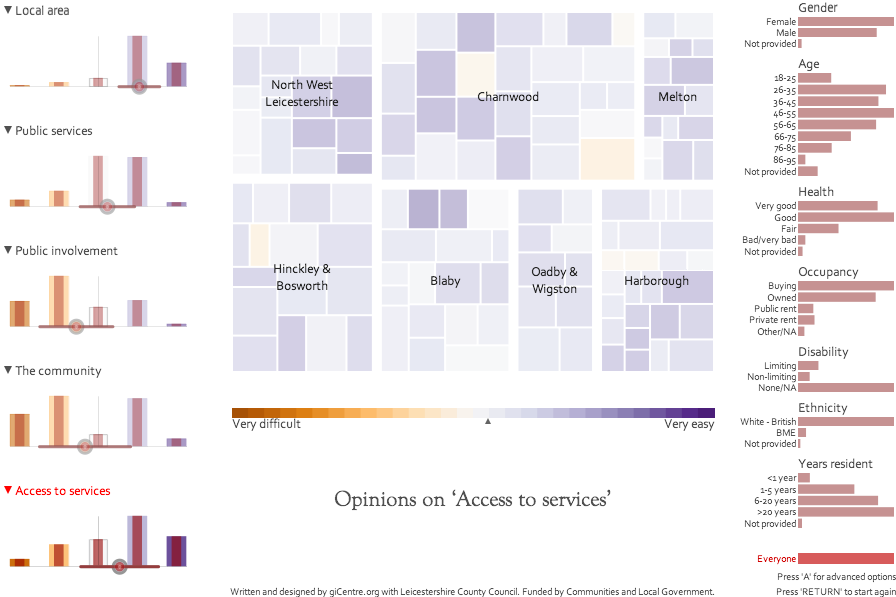Home » Featured Articles » How satisfied are the public with local services? Using data visualization to explore trends and engage citizens
How satisfied are the public with local services? Using data visualization to explore trends and engage citizens
With the public sector facing unprecedented cutbacks, it’s increasingly important for local authorities to understand how satisfied their residents are with local services and engage them in the assessment of whether limited budgets are being spent in the right places. City University London’s giCentre has used the emerging field of data visualization to help Leicestershire County Council do just that.
Swamped with data
Many local authorities conduct surveys, asking their residents how happy they are with the services and amenities in their area. But the vast amount of data collected in this process often goes to waste – analysts find it difficult to interpret results and present them to their colleagues, while citizens themselves rarely gain access to the information.
A collaborative project between City’s giCentre (www.gicentre.org) and Leicestershire County Council (www.leics.gov.uk) (LCC) has addressed this problem, by using novel visual approaches to better understand and share the results of a survey of 8,000 citizens.
It is one of 20 pilot schemes under the Department for Communities and Local Government’s (www.communities.gov.uk) (CLG) Timely Information to Citizens initiative. The project was conducted by Drs Jason Dykes, Aidan Slingsby and Jo Wood at City, in partnership with LCC’s Research Manager, Robert Radburn.
The benefits of visualization
“Visual means of presenting geographic information have always been hugely beneficial and are allowing us to present and provide access to data in interpretable ways,” says Dykes, Professor of Visualization at City. “The online resource we created with LCC is an innovative combination of interactive maps and charts. These are manipulable, enabling specific information – for particular services or places – to be extracted rapidly. Previously unnoticed trends can be uncovered by interacting with information in this ‘visual analytic’ manner.”
The resource is publicly available at www.lsr-online.org/placesurvey.html, enabling staff at LCC, citizens of Leicestershire and partners such as the emergency services and the NHS to better understand public satisfaction with the services and amenities that are offered by the authority.
Exploring satisfaction
Responses from residents across Leicestershire’s 134 electoral wards were visualized. Participants were asked their level of satisfaction with 57 aspects of life in the county – from how satisfied residents are with the quality of refuse and recycling collections to whether they feel well-informed about how their council tax is spent.
Respondents also provided personal characteristics such as gender, age, ethnicity and health, enabling the degree to which responses vary amongst different demographic groups to be considered. For example: comparing the views of 66-75 year olds to those of 18-25 year olds; contrasting the opinions of people who have lived in the same place for more than 20 years with those of recent arrivals; or seeing whether people in one district are more satisfied than those in another.
An introductory tutorial greets users when they first begin exploring the survey results, making the information accessible to as wide an audience as possible.
“We hope that this will help people to reflect on what they value about their community and to find out what neighbours think across the county,” says Slingsby, Willis Research Fellow at City.
Looking ahead
The local authority anticipates using similar approaches in future to visualize the results from other surveys and data sets, making these available to citizens and council employees to tailor services.
LCC’s Radburn concludes: “The idea of ‘Big Society’ – of giving power to the people, rather than politicians – has increased the importance of transparency in local government.
“Data visualization is one method through which we can create more openness, giving our residents a greater understanding of what the Council is doing in their immediate locale and enabling them to hold us to account.
“The expertise that we’re developing with the giCentre is ground-breaking in terms of local authority practice in the UK and is having a wide impact in our organisation.”


Latest Comments